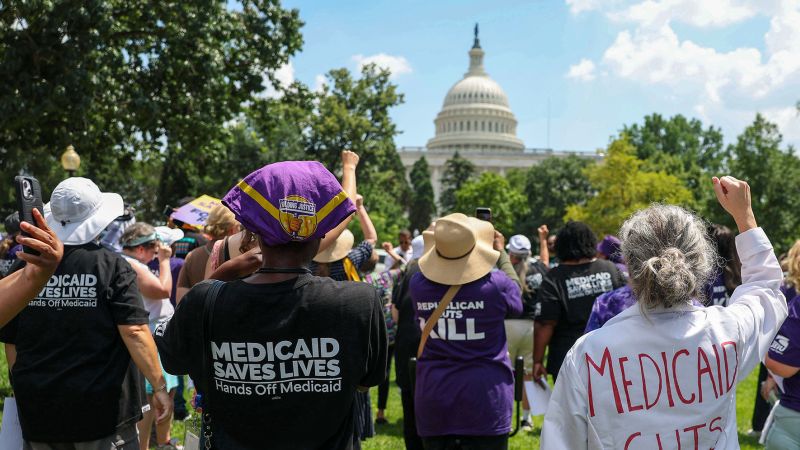- Get link
- X
- Other Apps
- Get link
- X
- Other Apps

Republican Medicaid Overhaul Rattles 2026 Midterm Landscape
The political tremors from the Republican push to overhaul Medicaid are already being felt as far ahead as the 2026 midterm elections. While Senate Republicans are still hammering out the details of their version of President Trump's domestic policy proposal, many GOP lawmakers facing reelection are bracing for the potential fallout from the bill's proposed Medicaid cuts.
Several Republican senators are voicing concerns:
- Sen. Susan Collins of Maine is advocating for a provider relief fund to cushion the impact.
- Sen. Thom Tillis of North Carolina has cautioned GOP leaders about the significant number of constituents who could lose healthcare coverage.
- Sen. Joni Ernst of Iowa is already facing a wave of Democratic challengers who are using her controversial "Well, we all are going to die" comment in response to Medicaid cut concerns as campaign ammunition.
A KFF analysis suggests that tens of thousands of people could lose coverage in each of these senators' states, based on the version of the bill already passed by the Republican-led House. Democrats, smelling blood in the water, are hoping to capitalize on these anxieties to erode the Republicans' current 53-seat Senate majority and potentially retake the House.
A central pillar of the Democratic strategy is linking the Medicaid cuts, which disproportionately affect low-income Americans, to tax breaks for the wealthy. The Congressional Budget Office (CBO) estimates that these changes could slash federal Medicaid spending by approximately $800 billion over 10 years. This would largely be achieved through the implementation of work requirements for certain Medicaid-eligible adults and the postponement of a Biden administration initiative designed to simplify enrollment and renewal processes.
"It is crazy politics for them to do this," asserts Brad Woodhouse, Executive Director of Protect Our Care, a healthcare advocacy group that has launched a $10 million campaign to oppose the Medicaid cuts. "Everyone is going to be unhappy with this bill, unless you’re a very high net worth individual: a millionaire, a multi-millionaire, a billionaire, or a large corporation."
However, many Republicans maintain that the Medicaid cuts are essential for ensuring the long-term sustainability of the program for those who truly need it. They are also banking on the broader appeal of other aspects of the bill.
Paul Shumaker, a seasoned North Carolina GOP strategist, remains "bullish" about the midterm elections. He believes voters will ultimately support the Republican narrative of eliminating waste, fraud, and abuse within the Medicaid system. He also anticipates support for other policies within the legislative package, such as tax cuts on tips and overtime pay, and enhancements to the child tax credit.
"Democrats are basically staking themselves out on issues that resonate with one-third of the voters, whereas Republicans have staked themselves out on issues that resonate with two-thirds of the voters," Shumaker argues. "They have put themselves into a box."
Democrats are wagering that their laser focus on the bill's healthcare provisions will resonate deeply with voters, even in states like Iowa, where they are aiming to unseat Ernst, contest an open governor’s seat, and compete for two US House seats.
The controversy surrounding Ernst's "Well, we all are going to die" comment has undoubtedly energized Democratic voters. J.D. Scholten, a new Democratic challenger, stated, "We’re seeing people, just everyday people calling Ernst ‘Joni Hearse.’ You just get that sense, politically, that if we can tap into that … this is where our foot’s in the door to a lot of voters who have not been voting Democrat."
The proposed Medicaid overhaul is also causing concern among some Senate Republicans. Senators like Tillis and Collins have voiced reservations about the bill's potential impact on their respective states, particularly a Senate proposal to limit the extent to which states can raise provider taxes, a crucial source of revenue. These concerns highlight the delicate balance Republicans are trying to strike between fiscal responsibility and ensuring adequate healthcare access for their constituents.
While the political maneuvering continues, it's clear that the Republican push to overhaul Medicaid has already ignited a fiery debate that will likely play a significant role in shaping the 2026 midterm elections. The coming months will reveal whether the GOP can successfully navigate these political headwinds and convince voters that their vision for Medicaid reform is the right one for the future.
Source: https://edition.cnn.com/2025/06/28/politics/republican-plans-to-overhaul-medicaid-already-shaking-up-2026-midterms
2026 election
Democratic Challengers
GOP
Health Care
Joni Ernst
Medicaid cuts
Senate Republicans
Susan Collins
Thom Tillis
Trump policy
- Get link
- X
- Other Apps
Comments
Post a Comment